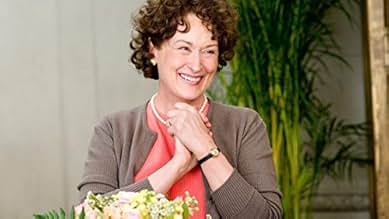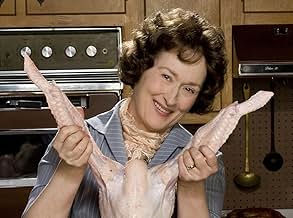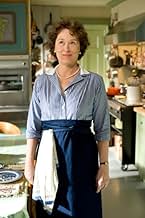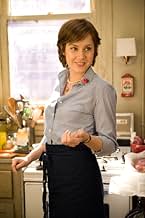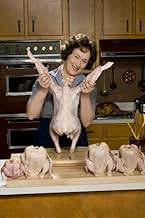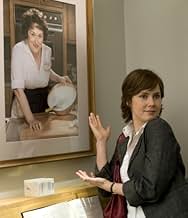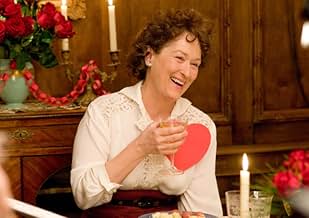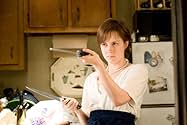खाना पकाने के पेशे में अपनी शुरुआत की जूलिया चाइल्ड की कहानी ब्लॉगर जूली पॉवेल की 2002 की चुनौती के साथ जुड़ी हुई है ताकि चाइल्ड की पहली पुस्तक में सभी व्यंजनों को पकाया जा सके।खाना पकाने के पेशे में अपनी शुरुआत की जूलिया चाइल्ड की कहानी ब्लॉगर जूली पॉवेल की 2002 की चुनौती के साथ जुड़ी हुई है ताकि चाइल्ड की पहली पुस्तक में सभी व्यंजनों को पकाया जा सके।खाना पकाने के पेशे में अपनी शुरुआत की जूलिया चाइल्ड की कहानी ब्लॉगर जूली पॉवेल की 2002 की चुनौती के साथ जुड़ी हुई है ताकि चाइल्ड की पहली पुस्तक में सभी व्यंजनों को पकाया जा सके।
- 1 ऑस्कर के लिए नामांकित
- 26 जीत और कुल 48 नामांकन
Crystal McCreary
- Ernestine
- (as Crystal Noelle)
फ़ीचर्ड समीक्षाएं
Nora Ephron's terrible miscalculation doesn't spoil things completely but it certainly hurts what it could have been, one of the best films of the year with a superlative performance by Meryl Streep. The performance more than survives, thank God, because I believe in years to come it will be considered one of Meryl's best. Imagine that! I loved her! Her Julia Child is total, complete, overwhelming, enchanting, inspiring. A woman of her day that was way, way ahead, in every department. A woman who was capable of love in the most direct and powerful way. She even loved the French for all the right reasons. When the films moves away from her the film suffers, terribly. The modern, neurotic kitchen of the modern woman is much more "passè" than the vintage one. In fact the vintage one is the ultra modern. But, as Billy Wilder used to say, we have to take the bitter with the sour. The film gets your gastric juices going and vindicates the power of butter in a way we hadn't seen since Last Tango In Paris. Stanley Tucci is also a delight and a perfect foil for her much taller wife. Bravo Meryl. once more, thank you, you're my hero.
I want to reiterate what Anderson said. I read the book and was so utterly disappointed that I tossed the book into the rubbish. I rarely do that and usually donate to libraries, but in this case, I didn't want to share the pain inflicted by reading it.
Nevertheless, being a fan of Julia I was compelled to see the movie. Meryl Streep and Stanley Tucci were outstanding. Her portrayal of Julia Child was captivating and nothing short of brilliant. Unfortunately those parts were too few. Instead the viewer gets an overload of this self-absorbed whiny bi-polar type character that annoyed me so much that I left during one of her parts. While she was on the screen it was as painful as reading the book.
It would be wonderful if they would take the same two actors (Meryl and Stanley) and make a full movie of just that.
It was so apparent that Julie was trying to use the fame of Julia Childs for her own benefit. It's not ethical, period! And she even tries to be a sad little victim after it was implied that Julia didn't endorse her. grrrrr! I don't admire anyone who uses people like that, especially passionless whiny people who seem to act like everything revolves around them.
So, seven stars go only to the portrayal of Julia and husband. and 1 star to the Julie character because it was a fun idea to do the blog on the recipe experiment. I just didn't like the lack of passion and the free ride she took on a lovely brilliant lady who gave so much to us amateur chefs.
Most anyone can be taught things, but the charm and passion come from within. Julia was one in a million!
Nevertheless, being a fan of Julia I was compelled to see the movie. Meryl Streep and Stanley Tucci were outstanding. Her portrayal of Julia Child was captivating and nothing short of brilliant. Unfortunately those parts were too few. Instead the viewer gets an overload of this self-absorbed whiny bi-polar type character that annoyed me so much that I left during one of her parts. While she was on the screen it was as painful as reading the book.
It would be wonderful if they would take the same two actors (Meryl and Stanley) and make a full movie of just that.
It was so apparent that Julie was trying to use the fame of Julia Childs for her own benefit. It's not ethical, period! And she even tries to be a sad little victim after it was implied that Julia didn't endorse her. grrrrr! I don't admire anyone who uses people like that, especially passionless whiny people who seem to act like everything revolves around them.
So, seven stars go only to the portrayal of Julia and husband. and 1 star to the Julie character because it was a fun idea to do the blog on the recipe experiment. I just didn't like the lack of passion and the free ride she took on a lovely brilliant lady who gave so much to us amateur chefs.
Most anyone can be taught things, but the charm and passion come from within. Julia was one in a million!
The good parts of "Julie and Julia" are so darn strong, beautiful, and new that J&J becomes an instant classic. Grateful audiences are going to be laughing and crying and being inspired by this movie for a long, long time. The Julie portion is the weaker of the two, but not so weak that it sinks the film.
Meryl Streep as Julia Child is one of the most endearing, arresting performances ever. That the real Julia Child and her groupies irritate me no end in no way interfered with my appreciation of Streep's amazing characterization. I laughed and cried several times, I was so engaged in the cinematic Streep/Child's story.
Streep's chemistry with Stanley Tucci as Paul Child, Julia's husband, is breathtaking. No attempt is made to make Streep or Tucci conventionally attractive. No attempt is made to make them look young and dewy – they weren't – Julia married Paul when she was in her thirties and he was ten years older. Julia is tall; Paul is short; Julia is loud; Paul is bald, quiet and retiring. It is implied that they can't have children. They don't share conventionally romantic movie moments; they don't "meet cute," there's no candlelight, no slow dances, no full frontal nudity, no vulgar language (with one hilarious exception involving cannelloni).
All Paul and Julia do is share the drudgery and rewards of working life: hers as a cook, his as a state department official. The key to Streep and Tucci's chemistry is that they portray two characters who love each other. Watching a loving, married couple in a marriage that works is one of the great, and sadly rare, pleasures of this film. Steep and Tucci are every bit as charismatic a couple as Tracy and Hepburn. Jane Lynch is also brilliant in a small role as Julia's sister.
The Julia segments take place in post-war Paris, and the Paris of this film, one of elegant cafes, haute couture and vintage cars, is someplace we all wished we lived (except for the ever-present cigarette smoke.) No matter how you feel about cooking, the film gets you to care about Julia's slowly being drawn into her destiny as one of the legendary chefs of all time. You also care about, and respect, Paul, his career and its ups and downs in the McCarthy era, and his support of his wife.
The Julie Powell portion of the movie is the weaker portion. I really like the film's structure of switching back and forth between contemporary Queens and post-war Paris, contrasting a career woman's attempt to cook all of Julia Child's recipes with Julia Child herself, before she became famous. I just think that the film fails its own structure by simply not making the Julie Powell portion as interesting as the Julia Child portion. Some have complained that Queens is depicted as being too dismal, and Paris too elegant. It's more than that, though.
I think Ephron, a brilliant filmmaker, drops the ball with Julie Powell because she never engages the tough questions about Powell's experiment. Was Powell just someone eager for fame in the Warhol era of "Everyone is famous for fifteen minutes"? Was Powell parasitizing Child's fame? Was Powell a bad wife to her husband as she obsessed on completing her self assigned task? Have blogs killed quality writing? Was Julia Child correct in her condemnation of Powell? I am not saying that the answer to any of the above questions is "Yes." I'm not bashing Julie Powell. I'm saying that by not engaging them, Ephron made the Julie portion of the film simply not as interesting as it could have been had these very real questions been engaged. Instead, Ephron tries to turn Julie into a cute, bland Meg Ryan character, and it never works, not for an instant. When Powell has lunch with her career gal friends, her friends are such Gordon Gecko style sharks that we care less for Powell for being so needy as to want to impress them. The absolute worst scene in the movie comes when Powell, who has never been depicted as feeling happy or fulfilled, not with her job, not with her husband, not with her home life, plays 65 answering machine messages from agents, editors, and publishers who want to make her famous. As these messages play, she has sex with her husband, and her husband's comment lets us know that this is the first time in a long while that he has experienced satisfaction from his wife.
The message of that scene is so tawdry, it cheapens the glow created by the Julia portion of the film, that shows Julia Child achieving satisfaction *before she ever becomes famous*. Julia *loved* cooking. Julia *loved* her husband. Yes, she celebrates when Knopf wants to publish her book, but she is so divorced from the rat race that she doesn't even know how to pronounced "Knopf" – whether the initial K is silent.
Julie Powell is depicted as needing fame to feel good about herself, and the movie never interrogates that. Had it done so, the Julie segments would have been as interesting as the Julia ones.
In any case, this is a great film that will enjoy a much deserved embrace by its fans.
Meryl Streep as Julia Child is one of the most endearing, arresting performances ever. That the real Julia Child and her groupies irritate me no end in no way interfered with my appreciation of Streep's amazing characterization. I laughed and cried several times, I was so engaged in the cinematic Streep/Child's story.
Streep's chemistry with Stanley Tucci as Paul Child, Julia's husband, is breathtaking. No attempt is made to make Streep or Tucci conventionally attractive. No attempt is made to make them look young and dewy – they weren't – Julia married Paul when she was in her thirties and he was ten years older. Julia is tall; Paul is short; Julia is loud; Paul is bald, quiet and retiring. It is implied that they can't have children. They don't share conventionally romantic movie moments; they don't "meet cute," there's no candlelight, no slow dances, no full frontal nudity, no vulgar language (with one hilarious exception involving cannelloni).
All Paul and Julia do is share the drudgery and rewards of working life: hers as a cook, his as a state department official. The key to Streep and Tucci's chemistry is that they portray two characters who love each other. Watching a loving, married couple in a marriage that works is one of the great, and sadly rare, pleasures of this film. Steep and Tucci are every bit as charismatic a couple as Tracy and Hepburn. Jane Lynch is also brilliant in a small role as Julia's sister.
The Julia segments take place in post-war Paris, and the Paris of this film, one of elegant cafes, haute couture and vintage cars, is someplace we all wished we lived (except for the ever-present cigarette smoke.) No matter how you feel about cooking, the film gets you to care about Julia's slowly being drawn into her destiny as one of the legendary chefs of all time. You also care about, and respect, Paul, his career and its ups and downs in the McCarthy era, and his support of his wife.
The Julie Powell portion of the movie is the weaker portion. I really like the film's structure of switching back and forth between contemporary Queens and post-war Paris, contrasting a career woman's attempt to cook all of Julia Child's recipes with Julia Child herself, before she became famous. I just think that the film fails its own structure by simply not making the Julie Powell portion as interesting as the Julia Child portion. Some have complained that Queens is depicted as being too dismal, and Paris too elegant. It's more than that, though.
I think Ephron, a brilliant filmmaker, drops the ball with Julie Powell because she never engages the tough questions about Powell's experiment. Was Powell just someone eager for fame in the Warhol era of "Everyone is famous for fifteen minutes"? Was Powell parasitizing Child's fame? Was Powell a bad wife to her husband as she obsessed on completing her self assigned task? Have blogs killed quality writing? Was Julia Child correct in her condemnation of Powell? I am not saying that the answer to any of the above questions is "Yes." I'm not bashing Julie Powell. I'm saying that by not engaging them, Ephron made the Julie portion of the film simply not as interesting as it could have been had these very real questions been engaged. Instead, Ephron tries to turn Julie into a cute, bland Meg Ryan character, and it never works, not for an instant. When Powell has lunch with her career gal friends, her friends are such Gordon Gecko style sharks that we care less for Powell for being so needy as to want to impress them. The absolute worst scene in the movie comes when Powell, who has never been depicted as feeling happy or fulfilled, not with her job, not with her husband, not with her home life, plays 65 answering machine messages from agents, editors, and publishers who want to make her famous. As these messages play, she has sex with her husband, and her husband's comment lets us know that this is the first time in a long while that he has experienced satisfaction from his wife.
The message of that scene is so tawdry, it cheapens the glow created by the Julia portion of the film, that shows Julia Child achieving satisfaction *before she ever becomes famous*. Julia *loved* cooking. Julia *loved* her husband. Yes, she celebrates when Knopf wants to publish her book, but she is so divorced from the rat race that she doesn't even know how to pronounced "Knopf" – whether the initial K is silent.
Julie Powell is depicted as needing fame to feel good about herself, and the movie never interrogates that. Had it done so, the Julie segments would have been as interesting as the Julia ones.
In any case, this is a great film that will enjoy a much deserved embrace by its fans.
i never really liked Meryl Streep that much until "Doubt" last year. and i've always been in love with Amy Adams. so when i found out the two were in yet another film together, i jumped at the chance to go to a prescreening.
i expected the film to be good, but it was even better than expected. humor was one of the driving forces of the film, but that didn't take away from some more serious moments- rather, it accentuated them and made them all the more poignant and even heartbreaking.
Ms. Streep is nothing short of perfect as cooking personality Julia Child. in fact, it may be the best performance yet i've seen from her. hilarious, lovable, passionate, and tender, she hit every note perfectly.
Ms. Adams, likewise, was superb as Julie Powell, a government worker who decided to tackle Julia Child's 500+ recipes in her groundbreaking cook book in a year's time while documenting online the whole process in a blog.
the two true stories are perfectly balanced, and the screenplay (adapted by the director Nora Ephron) strikes some wonderful parallels between the two women, and paints, or rather, cooks up two great ingredients to become one delicious dish.
there is a bit of a lag in the second half of the movie, but this is forgiven by the fact that the movie never becomes distracted from its purpose. excellent cast, fantastic story-telling, and wonderful direction. Julie & Julia will have you holding out your dish begging for more.
i expected the film to be good, but it was even better than expected. humor was one of the driving forces of the film, but that didn't take away from some more serious moments- rather, it accentuated them and made them all the more poignant and even heartbreaking.
Ms. Streep is nothing short of perfect as cooking personality Julia Child. in fact, it may be the best performance yet i've seen from her. hilarious, lovable, passionate, and tender, she hit every note perfectly.
Ms. Adams, likewise, was superb as Julie Powell, a government worker who decided to tackle Julia Child's 500+ recipes in her groundbreaking cook book in a year's time while documenting online the whole process in a blog.
the two true stories are perfectly balanced, and the screenplay (adapted by the director Nora Ephron) strikes some wonderful parallels between the two women, and paints, or rather, cooks up two great ingredients to become one delicious dish.
there is a bit of a lag in the second half of the movie, but this is forgiven by the fact that the movie never becomes distracted from its purpose. excellent cast, fantastic story-telling, and wonderful direction. Julie & Julia will have you holding out your dish begging for more.
Saw it at a Sunday matinée in the multiplex up the street. The place was packed and we got there just in time -- the theater sold out right after we got our tickets. Seems to be a popular movie, here in DC anyway.
Young married Julie Powell is a miserable cubicle-dweller whose husband encourages her to write a blog about preparing every recipe in volume one of Julia Child's "Mastering the Art of French Cooking" in the space of a year. Great premise, right? Clever story involving a young woman finding fulfillment through Julia Child, the French Chef, the first Public Television superstar? Well, I read the book and I gotta say I didn't care too much for Julie Powell, who came across as a basically unpleasant human being I'd never invite to dinner. But the premise really got to me. "Mastering the Art..." is the cookbook I have always turned to when I want to prepare a truly special dinner. I've had the box set of volumes one and two since the 70s, and gotta tell you they're well-used. Volume one is falling apart, in fact. (Anybody know a good book binder in DC?) So what WOULD it be like to devote a year's spare time to that wonderful instruction manual for home chefs? I wanted to have the experience without doing the work, so of course I read the book. But golly, I didn't want to read about Julie's ovaries and her girlfriends' weirdnesses and her lust for some actor and on and on with the girl talk. What a totally tiresome book it was.
Anyway, I plowed through Julie and Julia thinking I'd eventually be charmed, but I wasn't. Too bad. And now comes the movie, and I'm thinking Nora Ephron will surely correct the book's biggest flaw, which was too much time (~90%) devoted to Julie's blog-slog and only a few fascinating pages devoted to Julia Child.
And I was right. The movie gives the stories I'd say about equal time, which is still too much Julie/Amy Adams, and not enough Julia/Meryl Streep, but it's SO much a better mix than the book. The life of Julia Child could make a good movie on its own without all the gimmickry. But this is a perfectly entertaining movie in spite of it.
Speaking of Meryl Streep, she is a marvel to behold in this movie. Her impersonation is dead on, even better than Dan Ackroyd's, which is featured prominently and hilariously in the film.
"Julie and Julia" argues that Julia Child changed the way America eats, and the more I learn about her the less I feel inclined to argue about that. The movie brings her fascinating story to life and if I had to put up with a few scenes of Julie Powell melting down, well ... so what? It's a great movie if you have been in love with Julia Child as I have for many years, and a perfectly good one if you haven't.
Young married Julie Powell is a miserable cubicle-dweller whose husband encourages her to write a blog about preparing every recipe in volume one of Julia Child's "Mastering the Art of French Cooking" in the space of a year. Great premise, right? Clever story involving a young woman finding fulfillment through Julia Child, the French Chef, the first Public Television superstar? Well, I read the book and I gotta say I didn't care too much for Julie Powell, who came across as a basically unpleasant human being I'd never invite to dinner. But the premise really got to me. "Mastering the Art..." is the cookbook I have always turned to when I want to prepare a truly special dinner. I've had the box set of volumes one and two since the 70s, and gotta tell you they're well-used. Volume one is falling apart, in fact. (Anybody know a good book binder in DC?) So what WOULD it be like to devote a year's spare time to that wonderful instruction manual for home chefs? I wanted to have the experience without doing the work, so of course I read the book. But golly, I didn't want to read about Julie's ovaries and her girlfriends' weirdnesses and her lust for some actor and on and on with the girl talk. What a totally tiresome book it was.
Anyway, I plowed through Julie and Julia thinking I'd eventually be charmed, but I wasn't. Too bad. And now comes the movie, and I'm thinking Nora Ephron will surely correct the book's biggest flaw, which was too much time (~90%) devoted to Julie's blog-slog and only a few fascinating pages devoted to Julia Child.
And I was right. The movie gives the stories I'd say about equal time, which is still too much Julie/Amy Adams, and not enough Julia/Meryl Streep, but it's SO much a better mix than the book. The life of Julia Child could make a good movie on its own without all the gimmickry. But this is a perfectly entertaining movie in spite of it.
Speaking of Meryl Streep, she is a marvel to behold in this movie. Her impersonation is dead on, even better than Dan Ackroyd's, which is featured prominently and hilariously in the film.
"Julie and Julia" argues that Julia Child changed the way America eats, and the more I learn about her the less I feel inclined to argue about that. The movie brings her fascinating story to life and if I had to put up with a few scenes of Julie Powell melting down, well ... so what? It's a great movie if you have been in love with Julia Child as I have for many years, and a perfectly good one if you haven't.
क्या आपको पता है
- ट्रिवियाDuring the Valentine's Day dinner, one of the guests asks Julia and Paul if they were spies in the war. Both of them deny this. At the time the modern half of the film was set (2002), the Childs' wartime files had not yet been declassified, but by the time the film itself was made (2009), their records had been made public and it was revealed that Julia had served as a top-secret researcher for the OSS. The filmmakers elected to go only with facts that were established knowledge in 2002, but the spy conversation was thrown in as a sly nod toward the later revelation.
- गूफ़The film has Judith Jones stand Julie Powell up due to bad weather. Jones told the Boston Globe in August 2009 that, in fact, she had wanted to meet Julie "because I wasn't sure how you put a blog together and I also wanted to talk about recipe rights", but canceled because "Julia Child looked at her blog and didn't think Julie was a serious cook. There were all these four-letter words - that isn't how you describe food if you care and if you're a good writer. Julia thought we shouldn't have anything to do with it."
- भाव
Paul Child: What is it that you *really* like to do?
Julia Child: Eat!
- कनेक्शनFeatured in The 81st Annual Academy Awards (2009)
- साउंडट्रैकPsycho Killer
Written by David Byrne, Chris Frantz (as Christopher Frantz) and Tina Weymouth
Performed by Talking Heads
Courtesy of Warner Bros. Records Inc.
By Arrangement with Warner Music Group Film & TV Licensing
टॉप पसंद
रेटिंग देने के लिए साइन-इन करें और वैयक्तिकृत सुझावों के लिए वॉचलिस्ट करें
विवरण
- रिलीज़ की तारीख़
- कंट्री ऑफ़ ओरिजिन
- भाषाएं
- इस रूप में भी जाना जाता है
- Julie y Julia
- फ़िल्माने की जगहें
- Hoboken Railway Station, होबोकेन, न्यू जर्सी, यूएसए(Julia child scenes)
- उत्पादन कंपनियां
- IMDbPro पर और कंपनी क्रेडिट देखें
बॉक्स ऑफ़िस
- बजट
- $4,00,00,000(अनुमानित)
- US और कनाडा में सकल
- $9,41,25,426
- US और कनाडा में पहले सप्ताह में कुल कमाई
- $2,00,27,956
- 9 अग॰ 2009
- दुनिया भर में सकल
- $12,95,40,522
- चलने की अवधि2 घंटे 3 मिनट
- रंग
- ध्वनि मिश्रण
- पक्ष अनुपात
- 1.85 : 1
इस पेज में योगदान दें
किसी बदलाव का सुझाव दें या अनुपलब्ध कॉन्टेंट जोड़ें








